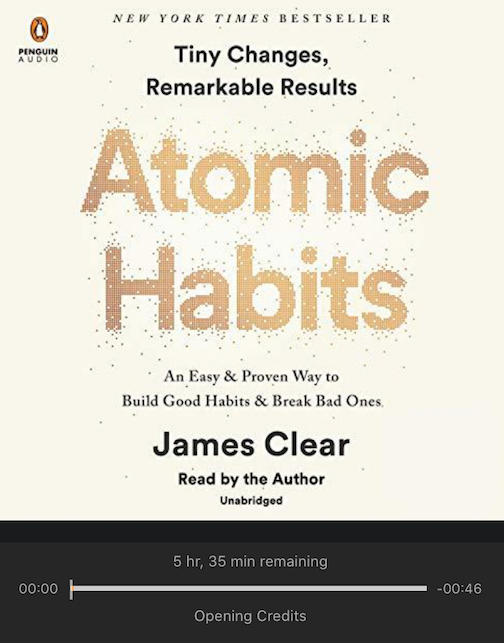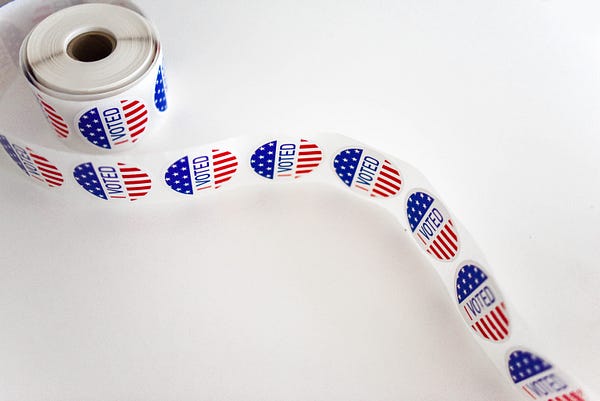Atomic Habits by James Clear

A book that many times came up in my recommended books on Audible, it was also recommended by Jennifer Fonseca. She is certainly someone whose opinion and considerations I value much heavier than the typical person. If the book impacted her, I wanted to read it. Then I finished the audiobook and caught up with a good friend of mine, Jaime Verd. He shared the impact that the book had on him also. I knew that I had made a great investment by going through this book not only because of the relatability I now had by finishing a book that others have as well, I learned a lot also.
Wow do I ever love this quotation. Don’t fake it until you make it, fake it until you become it.
“To write a great book, you must first become the book.” — Naval Ravikant
I loved this preface and I find it incredibly relevant. I agree. Human behaviors are fluid and nobody is going to be the same in every situation — it’s impossible. Being authentic is one thing but most of us have enough EQ to understand that people are unique and that saying something one way to one person is not going to have the same impact or result when we say it to someone else.
Human behaviors always change, situation to situation, moment to moment, second to second. This book is about the fundamentals of human behavior.

This is the way that I have started creating habits. I started reading books not with the goal of reading books but with the goal of becoming a CEO. I saw reports that showed the average CEO finished 50–60 books per year. Now, I look to exceed that number each and every calendar year — I’m not looking to be average in any way, I’m unique as each and every one of us is.
Many people build habits based on an outcomes. The best way is to focus on building identity-based habits. This means we focus on who we want to become rather than in what we want to achieve.
Which one are you? Are you someone who is trying to workout or are you a fitness enthusiast? Are you someone who is becoming more disciplined or are you a disciplined person?
When someone is offered a cigarette, one person says, no thanks, I’m trying to quit And the next says, no thanks, I’m not a smoker. One is still a smoker, the other isn’t.
Who are you? Most people don’t know you personally but many people see your behavior. More often than not, they draw their own conclusions or perceptions of you based on your repeated behavior. What do you believe? Do people see that through your actions? Then how strongly and closely do you truly believe that?
Your habits are how you embody your identity. The more you repeat a behavior, the more you reinforce the identity associated with that behavior.
The word identity was originally derived from the Latin words essentitas which means being and identidem which means repeated. Your identity is literally your repeated beingness.
This is something that jumped out to me. I listened to this part about 10 times in a row just over and over and over. WHO AM I? I continued to ask and search and prod. What type of behavior am I tolerating and why? Is that the right behavior? Why? Why not? I’m becoming somebody but am I voting for the right thing? I hope so.

Each habit is like a suggestion. Every action you take is a vote for the type of person you wish to become. As the votes build, you decide the evidence of your new identity.
The author never would have considered themselves a writer until they started posting articles every Monday and Thursday.
This is what the book is all about. We reinforce our identity through our actions that as the author shared previously. I live by the phrase, “trust but verify.” Everything I do, I evaluate and I calculate. People around me NEED to be aware enough of their actions. If you’re friends with me, if you’re in my circle, EACH and EVERY action that you partake in reflects upon me whether positively or negatively.
1. Decide the person you want to be.
2. Prove it to yourself in bits
“The focus should always be on becoming that type of person, not getting to your outcome.”
This is the absolute best definition of habits that I have ever heard. I agree, this is what habits are.
Habits are simply reliable solutions to recurring problems in our environment.
Hopefully people recognize what cravings truly are.
Every craving is linked to a desire to change an internal stage.
Repeat repeat repeat. It’s essential that we are able to understand this and know what is going on within our minds and through our actions. We must be able to identify our reasons for doing certain things and look deeper within ourselves to identify the motives that we have for various things.
Rewards are the end goal of every habit.
The cue is about noticing the reward.
The craving is about wanting the reward.
The response is about obtaining the reward.
For me, I focus most on the response. I know what I need to do and creating a disciplined environment for myself. The inversions of these 4 laws that are used to break bad habits are so important. I’ve done very good at making things unattractive and unsatisfying. I don’t enjoy going out at night anymore or going to the movies or drinking alcohol so I broke all those bad habits. Now, I only go to the movies with friends on occasion and most times, it’s not my idea.
The 4 laws of behavior change:
1. Cue — make it obvious
2. Craving — make it attractive
3. Response — make it easy
4. Reward — make it satisfying
Inversions to break bad habits:
1. Cue — make it invisible
2. Craving — make it unattractive
3. Response — make it difficult
4. Reward — make it unsatisfying
You must remove yourself from situations and circumstances that could sacrifice values and lead us to do the things that we do not desire to do. I have found that this is the best way to operate.
The way to increase self control is to spend less time in tempting situations. The best way to increase self control is to not use it often. The way to improve is to create a more disciplined environment.
Wow. This was surprising to me and something that I didn’t know beforehand. Neurocircuitry is always something that has interested me and I love learning about how the brain functions. Understanding more about why certain things are rewarding to us and why other things are not intrigue me and keep me extremely curious.

The reward system activated in the brain when you receive a reward is the same system activated when you receive a reward. This is why daydreaming about a vacation can be more enjoyable than actually being on it. Scientists refer to this as the difference between wanting and liking. Your brain has far more neurocircuitry for wanting rewards than liking them.
I thought this was one of the most important things to note from the entire book. It’s all about doing the little things that then lead to bigger things and long term habits.
What surveyed readers of the book say are the best one time actions that lock in good long term habits:
Nutrition — buy a water filter, use smaller plates to reduce caloric intake.
Sleep — buy a new mattress, blackout curtains, remove television from bedroom.
Productivity — unsubscribe from emails, turn off notifications from group messages, turn phone to silent, use email filters to clear up inbox, delete games and social media from your phone.
Happiness — buy a dog, move to a friendly social neighborhood.
General health — get vaccinated, buy good shoes to avoid back pain, buy a supportive chair or standing desk.
Finance — enroll in an automatic savings plan, set up automatic bill pay, cut cables, call service providers and ask to lower bills.
Love this. This is something that I think people need to pay better attention to. This is how children are often raised, we either reinforce them positively or negatively, why does that stop over time? I don’t think it should. We need to take full advantage of the compound effect.
The cardinal rule of behavior change:
What is immediately rewarded is repeated
What is immediately punished is avoided
As the saying goes, “the last mile is the least crowded”
I love discipline but growing up, I never really received much — though there was never much need for any. I am confident that when I have children I’ll be disciplining them frequently and holding them accountable for their actions.
The more immediate and costly the mistake is, the more quickly you learn from it.
It seems like everyone who is ultra-successful shares that they wish they could go back and learn this sooner in their life. I’m glad I know it now and have for a little while. Boredom is inevitable and working throughout any experience of boredom is essential.
The only way to become excellent is to be endlessly fascinated by doing the same thing over and over, you have to fall in love with boredom.

Amen. 100% agree and this is how I live my life. This is why I’ve read my Bible every morning for over 5 months without missing a day. This is why I have begun every morning with a prayer journal for the past year. Everything compounds.
Small habits don’t add up, they compound.
This book was spectacular just as I expected it to be. I didn’t know what to expect at first and I didn’t know if I would even like it but wow did I ever like this book. It was wonderful and impactful and rewarding to finish. This is a book that reinforced many of the things that I shape my life around and model myself after. I’m aware of most every decision I make as well as the underlying factors that play into each decision also.
I gave this book a 4.5/5
To read this book, get it here
